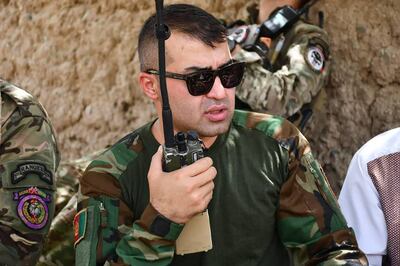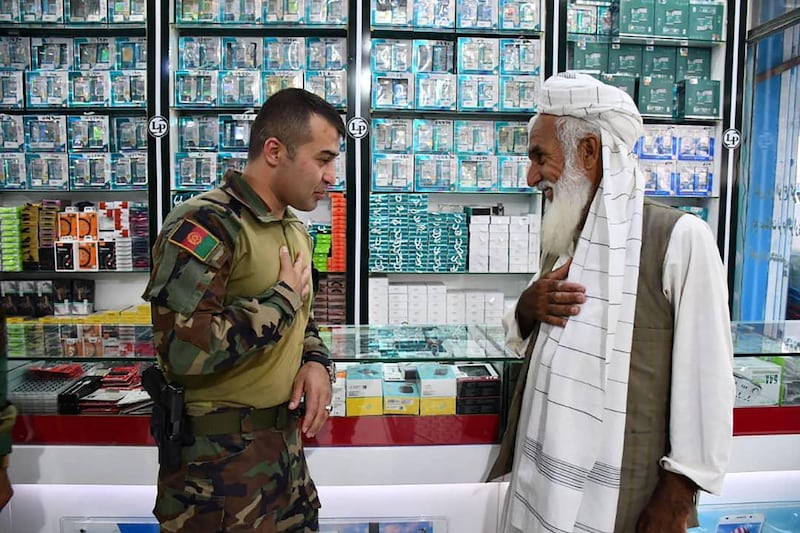Sami Sadat joined the ranks of countless political exiles who had to scramble to safety in the West following the fall of Kabul in 2021.
Like so many displaced Afghans, the former three-star general — who remains on the Taliban's “Top Three” kill list — finds himself facing an uncertain future, torn between the haunting nostalgia of his distant homeland and its current grim outlook.
Nearly two years have passed since the US and its partners relinquished control to the Taliban, ushering in an era of brutal rule based on an extremist interpretation of Islamic law.
As of 2023, Afghanistan remained one of the world’s largest humanitarian crisis, with two thirds of the country in need of humanitarian assistance and an estimated six million people “knocking on famine’s door”, according to the UN.
Reports from the world body describe human rights abuses from extrajudicial killings of opponents and their families to torture, arbitrary arrests and gender apartheid.
In an interview with The National in New York, Mr Sadat, 38, described the current situation as akin to “one big, large prison” for Afghans.
Recognised as one of the rising stars within the Afghan army, the soldier's stellar trajectory was evident early on.
The Afghan government strategically invested in Mr Sadat’s professional development from an early age.
He received military training in Germany, Britain, Poland and the US, and also served in Afghanistan's former spy agency, the National Directorate of Security.
The son of a distinguished senior army officer from Afghanistan's communist-era government, his personal history was marred by the brutal rule of the Taliban in the 1990s.
At age 14, he witnessed the imprisonment of his own father.
“As a young general, I considered it both my responsibility and my duty to fight for my people and liberate my country from the grip of the Taliban,” he said.
Mr Sadat denounced the Taliban as “un-Islamic” and accused them of being mere “stooges” manipulated by foreign powers to suppress Afghanistan.
His resolute stance resonated with his unwavering belief that such subjugation is totally “unacceptable”.
After the fall of Kabul, he escaped Afghanistan with help from the British and now lives in Europe.
But his past continues to dog his present. Last year, the Taliban reportedly paid a Turkish drug dealer to assassinate him.
He attributed the calamitous fall of Kabul to the Doha agreement in February 2020 — a deal struck between former US president Donald Trump's administration and the Taliban leadership.

Mike Pompeo, the US secretary of state at the time, asserted that the administration was “seizing the best opportunity for peace in a generation”.
But Mr Sadat says the deal spelt the end for then-president Ashraf Ghani's government in Kabul.
“It is definitely the United States' deal with the Taliban,” Mr Sadat said. “Our government lost its legitimacy internationally … and ultimately the government of Afghanistan collapsed.”
During the central government's decline, the Taliban received a significant boost when 5,000 hardened fighters were released from Afghan prisons as part of the deal.
The western-backed Afghan government protested against the prisoner release, considering it one of its last sources of leverage.
However, it eventually agreed under intense pressure from Washington, which threatened aid withdrawal.
“These were murderers. They were child killers. They were masterminds of suicide bombs. These were people who shot innocent Afghans and American soldiers,” said Mr Sadat, who was the commander responsible for successfully defending southern Afghanistan's Helmand province against a brutal Taliban offensive in 2021.
“Helmand is very important for Taliban because it has a huge border with Pakistan and Iran,” he explained.
President Joe Biden, although having the option to withdraw from the agreement, chose to honour it, stating that Washington no longer wanted to fight a war that Afghan troops were “not willing to fight for themselves”.
In an op-ed published in The New York Times on August 25, 2021, Mr Sadat said that 66,000 of his fellow soldiers had lost their lives during America's 20-year involvement in Afghanistan.
“Political divisions in Kabul and Washington strangled the army and limited our ability to do our jobs. Losing combat logistical support that the United States had provided for years crippled us, as did a lack of clear guidance from US and Afghan leadership,” he wrote.
On August 15, 2021, the day Mr Ghani, his commander-in-chief, fled Afghanistan, Mr Sadat said he “felt betrayed … that was the worst day of my life”.
Desperate, he turned to his American allies, hoping they would help provide security for Kabul and protect civilians.
To his dismay, a US general responded: “You don't have a government any more. So, we can't help you.”
Mr Sadat lamented: “That broke my heart. Not only did my president flee, but our allies also stopped supporting us.
“We felt humiliated.”
He shed light on a troubling consequence of the Taliban's tactics, highlighting the radicalisation of young Afghans through the exploitation of religion — a phenomenon that poses a significant threat to the fabric of Afghan society.
“They are turning young Afghans into fanatics, using religion for violence,” Mr Sadat said.
Stressing that the Taliban not only manipulates Islam to indoctrinate young minds, he said it also propagates the notion that Afghanistan is the sole Islamic country, dismissing other Muslim-majority nations as inadequately adherent to their extremist ideology.
Mr Sadat said Afghanistan is turning once more into a “terrorist safe haven”.
There are currently about 800 new Al Qaeda commanders, he noted, and about 40,000 foreign fighters who have returned to Afghanistan from countries such as Yemen, Iraq, Syria, Somalia, Kenya, Nigeria and others.
A resolute figure unwilling to capitulate, the former general is currently spearheading efforts to establish a coalition comprising like-minded generals, civil society activists and young Afghan leaders.
Their shared objective is to reinstate the “former constitution” and liberate the nation from the grip of the Taliban.
While Mr Sadat refrained from divulging specifics, he spoke on his continuing efforts to garner support from the US and Nato nations through concerted lobbying.
“It begs the question, how can we fix this?” he pondered.








